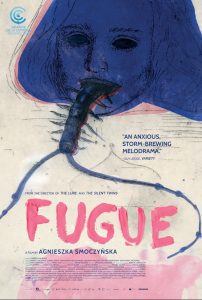 | MOVIE DETAILS • Name: Fugue (aka Fuga) • Year: 2018 • Country: Poland, Czech Republic, Sweden • Director: Agnieszka Smoczynska • Main cast: Gabriela Muskala, Lukasz Simlat, Malgorzata Buczkowska, Piotr Skiba • Runtime: 102 minutes • Production company: Maziowiecki Fundusz Filmowy, Film i Väst, Odra Film, Common Ground Pictures, Axman Productions, MD4 • TRAILER |
Agnieszka Smoczynska’s second movie, Fugue (2018), has been described both as an amnesia drama and an anxious investigation about womanhood. When we first find Alicja at an underground station, she doesn’t remember who she is nor where she comes from. While the plot unfolds through the figure of an apparently tough, unapologetic character, the story we discover afterwards is the one of another woman’s, one pretty much unrebellious, conventional. Yet, what makes the film what it is, it’s not Alicja’s story, but rather her surroundings
After been disappeared for two years, Alicja (masterfully played by Gabriela Muskała) is found by her family on a TV program. When she comes back home, she’s far from being the same person that left. Her house, her parents, her childhood are not part of her memories anymore, nor are her husband or even her child. Her physical appearance has changed radically too. The blond long-haired and well-dressed woman we saw stumbling confused in her heels in the first scene now wears a pixie cut, oversized clothes, and a nasty attitude. We will discover, not much later, what she meant before for the people around her: a perfect mother, the one who never caused trouble. However, why she left with no trace, doesn’t seem a quite legitimate question to ask.
Poland is a rather conservative country regarding gender politics. Nothing more than other places when it comes to idealizing motherhood. Speaking out about the dark sides of maternity is still a more or less conscious taboo for a big part of the audience. The image of the woman rejecting her children still causes rejection and even disgust among the public. Smoczynska’s smartness resides, indeed, in not telling the story of a rejecting mother, but rather picturing her relationships and how they strange themselves just to come back again.
Fugue (2018) definitely holds a rough and anxious aesthetic. While this might not be the most original, is this aesthetic – following tons of gray, dark spots, and brain waves mixed with flowers – rather than a pretty conventional plot, that allows us to connect with the main character. The dialogues swing between the sometimes absurd and dark complexity of the adult’s world and children’s honesty with a stunning simplicity to successfully explain Alicja’s situation from different perspectives.
And even if the story might leave us with more questions open than we started with, the aesthetic might be exactly the reason why. Fugue (2018) connects with womanhood from an intuitive, consciously irrational perspective. Alicja’s story is no more no less than any other one’s and is the subtle power game that takes place in a domestic context which finally makes sense in the movie and of Alicja.
There won’t be big surprises in the way how Alicja related to her husband. However, there might be something in the way her family sees her. Although, I personally had a slight feeling of emptiness after finishing the movie, of a suspicion of lack of courage that prevented the movie to dig deeper inside this power dynamics, this openness might have helped shape what the movie actually is: a smart, non-judgemental sight of womanhood and repression. In any way, and for once, a story that needed to be told.
RATE: 8/10
IMDB URL: http://www.imdb.com/title/tt7051048




